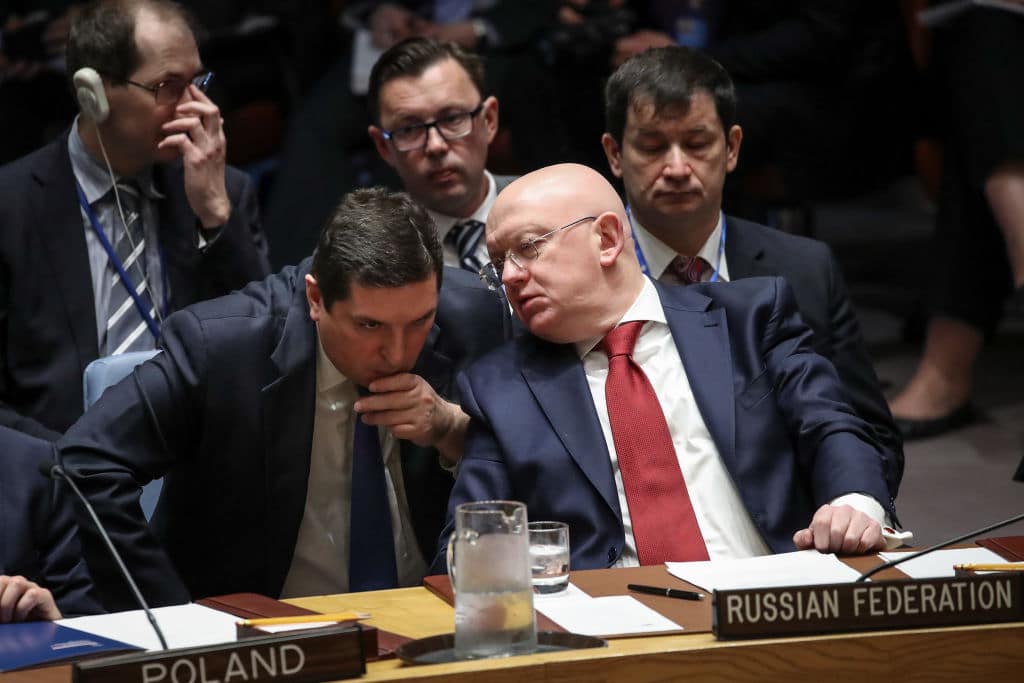US says it's 'locked and loaded' to strike Syria again...so what can Russia do now?

The United States warned Saturday that is was "locked and loaded," ready to launch more military strikes on Syria if President Bashar al-Assad's forces carry out a new chemical weapons attack.
US Ambassador Nikki Haley told an emergency Security Council meeting called by Russia that she had spoken to President Donald Trump earlier about the military action in response to an alleged chemical attack a week ago.
"I spoke to the president this morning and he said: If the Syrian regime uses this poisonous gas again, the United States is locked and loaded," Haley said.
"When our president draws a red line, our president enforces the red line," she said.

The United States, Britain and France took military action in response to an alleged chemical attack in the rebel-held town of Douma a week ago that killed at least 40 people.
Russia circulated a draft resolution calling for condemnation of the military action, but Britain's ambassador said the strikes were "both right and legal" to alleviate humanitarian suffering in Syria.
Russian Ambassador Vassily Nebenzia called for a vote during the meeting on the measure that condemns the "aggression" against Syria and demands that the allies refrain from any further military strikes.

The United States, Britain and France have argued that military action was necessary after Assad's forces had used toxic gases multiple times in violation of international law.
Air strikes by the allies on Saturday hit three targets that Western officials said were linked to chemical weapons development in the Damascus and Homs areas.
Haley said the United States was confident that the military strikes had crippled Syria's chemical weapons program.
"We are prepared to sustain this pressure, if the Syrian regime is foolish enough to test our will," she said.
So how will Russia respond
How will Russia respond to Western strikes against Moscow-allied Syrian President Bashar al-Assad's regime?
For all of the Kremlin's big talk and bluster, a military response is unlikely, with Moscow expected to stick to a barrage of diplomatic protests, experts say.
President Vladimir Putin "severely" condemned the strikes on Syria, adding that Washington was already responsible for the "bloodbath in Yugoslavia, Iraq and Libya."
But the Russian leader did not announce any retaliatory measures and Moscow simply called an emergency session of the United Nations Security Council.
Fyodor Lukyanov, the Kremlin-friendly editor of the Russia in Global Affairs magazine, ruled out the prospect of a direct military conflict between Moscow and Washington.

"As expected, the main objective was a show of force," Lukyanov told state news agency TASS, referring to the strikes carried out jointly by the US, Britain and France.
"The targets were chosen quite carefully to keep the situation under control."
Alexei Malashenko, head of research at Moscow's Institute for the Dialogue of Civilisations, struck a similar note.
"We do not hear anything about retaliatory strikes, this subject has disappeared," Malashenko told AFP.
"Practically everyone believes that a military response from Russia is not possible, this is very dangerous and can have the opposite effect."
Alexander Shumilin, director of the Center for the Analysis of Middle East Conflicts at the Institute for US and Canadian Studies, also said that a military response was not on the cards.
"The strikes were targeted and no direct damage was inflicted on Russia and Russians," Shumilin told AFP.
"Retaliatory steps can only be taken in the domains of politics and propaganda -- which is what's happening," Shumilin said.
"There's nothing else you can do."

Malashenko added: "There will be a lot of noise, a litany of speeches but no firm action will be taken. And then again, Russia cannot do anything."
He added that more strong rhetoric was expected from Russia at the United Nations. "But that does not mean anything," he added.
Konstantin Kosachev, chairman of the foreign affairs committee at Russian parliament's upper house, set the tone when he called for "legal" consequences, in one of Moscow's first comments after the strikes.
"I am absolutely convinced that our response to the situation should be legal and not military -- as long as our military installations in Syria are not affected," state news agency RIA Novosti quoted Kosachev as saying.
"This is of course an immediate session of the United Nations Security Council."